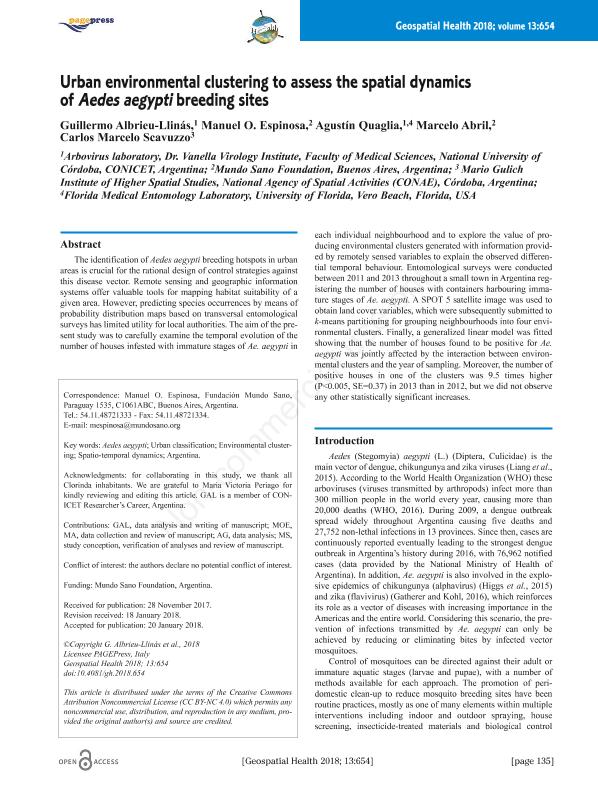Mostrar el registro sencillo del ítem
dc.contributor.author
Albrieu Llinás, Guillermo

dc.contributor.author
Espinosa, Manuel Osvaldo

dc.contributor.author
Quaglia, Agustín Ignacio Eugenio

dc.contributor.author
Abril, Marcelo
dc.contributor.author
Scavuzzo, Carlos Marcelo

dc.date.available
2022-08-05T14:15:34Z
dc.date.issued
2018-05
dc.identifier.citation
Albrieu Llinás, Guillermo; Espinosa, Manuel Osvaldo; Quaglia, Agustín Ignacio Eugenio; Abril, Marcelo; Scavuzzo, Carlos Marcelo; Urban environmental clustering to assess the spatial dynamics of Aedes aegypti breeding sites; Univ Naples Federico Ii; Geospatial Health; 13; 1; 5-2018; 135-142
dc.identifier.issn
1827-1987
dc.identifier.uri
http://hdl.handle.net/11336/164357
dc.description.abstract
The identification of Aedes aegypti breeding hotspots in urban areas is crucial for the rational design of control strategies against this disease vector. Remote sensing and geographic information systems offer valuable tools for mapping habitat suitability of a given area. However, predicting species occurrences by means of probability distribution maps based on transversal entomological surveys has limited utility for local authorities. The aim of the present study was to carefully examine the temporal evolution of the number of houses infested with immature stages of Ae. aegypti in each individual neighbourhood and to explore the value of producing environmental clusters generated with information provided by remotely sensed variables to explain the observed differential temporal behaviour. Entomological surveys were conducted between 2011 and 2013 throughout a small town in Argentina registering the number of houses with containers harbouring immature stages of Ae. aegypti. A SPOT 5 satellite image was used to obtain land cover variables, which were subsequently submitted to k-means partitioning for grouping neighbourhoods into four environmental clusters. Finally, a generalized linear model was fitted showing that the number of houses found to be positive for Ae. aegypti was jointly affected by the interaction between environmental clusters and the year of sampling. Moreover, the number of positive houses in one of the clusters was 9.5 times higher (P<0.005, SE=0.37) in 2013 than in 2012, but we did not observe any other statistically significant increases.
dc.format
application/pdf
dc.language.iso
eng
dc.publisher
Univ Naples Federico Ii

dc.rights
info:eu-repo/semantics/openAccess
dc.rights.uri
https://creativecommons.org/licenses/by-nc/2.5/ar/
dc.subject
AEDES AEGYPTI
dc.subject
ARGENTINA
dc.subject
ENVIRONMENTAL CLUSTERING
dc.subject
SPATIO-TEMPORAL DYNAMICS
dc.subject
URBAN CLASSIFICATION
dc.subject.classification
Ecología

dc.subject.classification
Ciencias Biológicas

dc.subject.classification
CIENCIAS NATURALES Y EXACTAS

dc.title
Urban environmental clustering to assess the spatial dynamics of Aedes aegypti breeding sites
dc.type
info:eu-repo/semantics/article
dc.type
info:ar-repo/semantics/artículo
dc.type
info:eu-repo/semantics/publishedVersion
dc.date.updated
2022-08-03T18:17:38Z
dc.identifier.eissn
1970-7096
dc.journal.volume
13
dc.journal.number
1
dc.journal.pagination
135-142
dc.journal.pais
Italia

dc.journal.ciudad
Pavia
dc.description.fil
Fil: Albrieu Llinás, Guillermo. Consejo Nacional de Investigaciones Científicas y Técnicas. Centro Científico Tecnológico Conicet - Córdoba; Argentina. Universidad Nacional de Córdoba. Facultad de Medicina. Instituto de Virología Dr. J. M. Vanella; Argentina
dc.description.fil
Fil: Espinosa, Manuel Osvaldo. Fundación Mundo Sano; Argentina
dc.description.fil
Fil: Quaglia, Agustín Ignacio Eugenio. Consejo Nacional de Investigaciones Científicas y Técnicas. Centro Científico Tecnológico Conicet - Córdoba; Argentina. Universidad Nacional de Córdoba. Facultad de Medicina. Instituto de Virología Dr. J. M. Vanella; Argentina. University of Florida; Estados Unidos
dc.description.fil
Fil: Abril, Marcelo. Fundación Mundo Sano; Argentina
dc.description.fil
Fil: Scavuzzo, Carlos Marcelo. Consejo Nacional de Investigaciones Científicas y Técnicas. Centro Científico Tecnológico Conicet - Córdoba; Argentina. Comisión Nacional de Actividades Espaciales. Instituto de Altos Estudios Espaciales "Mario Gulich"; Argentina. Fundación Mundo Sano; Argentina
dc.journal.title
Geospatial Health

dc.relation.alternativeid
info:eu-repo/semantics/altIdentifier/url/https://www.geospatialhealth.net/index.php/gh/article/view/654
dc.relation.alternativeid
info:eu-repo/semantics/altIdentifier/doi/https://doi.org/10.4081/gh.2018.654
Archivos asociados
